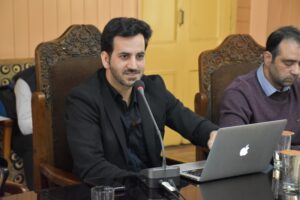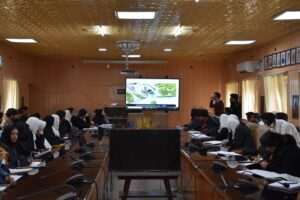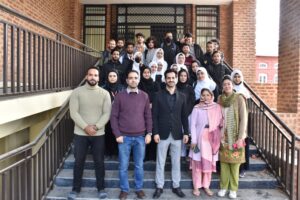Guest lecture on Science & Technology Reporting



Department of Journalism and Mass Communication, Government College for Women, M.A. Road organised a guest lecture on ‘Science & Technology Reporting’ on October 18, 2023. The guest speaker was Mr. Shakoor Rather who is currently working as News Editor and Head Science and Technology at India’s premier news agency Press Trust of India (PTI).
Students from various batches of journalism programme currently enrolled at the college viz., 5-year Integrated, 3-year Honors and 4-year NEP batch- attended the nearly four-hour-long session at the college conference hall.
Mr. Shakoor shared valuable tips about Science and Technology reporting. He started by emphasizing the relevance and importance of Science Journalism. He said this genre of reporting helps advance knowledge and innovation, educate the public, influence policy and decision making.
The guest speaker spoke about the various sources consulted by Science journalists including scientists, researchers and policymakers. He also referred to the importance of research papers, press releases of research institutions and official social media handles. He also spoke about the role of pre-prints.
Referring to the importance of audience, Mr. Shakoor said, “Before you start writing, think about who you’re writing for. Are you writing for scientists and experts in the field, or for a general audience? Use language that’s appropriate for your audience. Avoid jargon and technical terms unless you’re sure your readers will understand them.”
To understand technical terms, he suggested consulting web resources of reputed institutions like Centers for Disease Control and Prevention, World Health Organization, NASA, John’s Hopkins University, NIH and NHS.
Referring to the writing style, Mr. Shakoor said, “People love stories. Use storytelling techniques to make your science and tech reporting more engaging. Start with a hook to grab your readers’ attention. Use anecdotes, examples, and real-life scenarios to illustrate your points. And don’t forget to include a human angle -people are more interested in stories that relate to their own lives.”
He cited many examples from his own work to elaborate on the tips.
The guest speaker said accuracy is crucial in science and tech reporting. “Make sure you’re getting your facts straight and double-checking your sources. Use reputable sources and avoid sensationalism. Remember that your readers trust you to provide them with accurate information,” he added.
Referring to the power of visuals, Mr. Shakoor said, “Visuals can help you communicate complex ideas in a simple way. Use graphs, charts, and diagrams to illustrate your points. Use photos and videos to add interest and break up long blocks of text. But be careful not to use visuals just for the sake of it – make sure they’re adding value to your story.”
He referred to the various types of science and technology reporting including News Articles, Features and Op-Eds, Data Journalism, Multimedia Presentations, Videos, Podcasts etc.
Regarding the need for crafting compelling headlines, he said, “Your headline is the first thing your readers will see, so make it count. Use strong, active verbs and be specific about what your story is about. Make sure your headline accurately reflects the content of your story. And don’t forget to make it interesting – your headline should entice readers to click and read more.”
About the importance of editing and revising, he said, “Read over your work carefully and make sure it makes sense. Cut out any unnecessary words or phrases. Make sure your sentences flow smoothly and are easy to read. And don’t forget to proofread for spelling and grammar errors.”
He referred to various science news outlets and resources including The Conversation, The Atlantic, New Scientist, Space.Com, Sciencealert, Sciencedaily, Phys.Org among others.
The guest speaker answered the questions of the students towards the end of the session.
Earlier while introducing the guest and the theme, Head, Department of Journalism and Mass Communication, Dr. Suhail Ahmad said Science and Technology reporting has emerged as one of the key genres in recent times.
“As a conscious effort to train our students in Science and Technology reporting besides the traditional beats of Politics, Business, Crime and Sports, we introduced the specific paper on Science and Tech in Semester 5,” he said, adding that the department encourages students to look for news stories regarding the developments in science and technology with particular reference to Kashmir.
“In this regard, we will continue to invite relevant speakers to enhance the understanding of students and hone their reporting skills,” he added.


Recent Comments